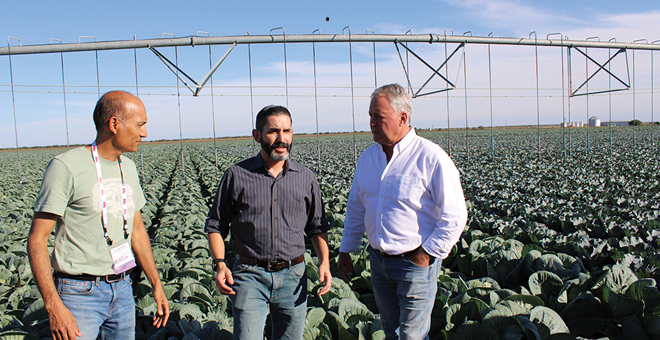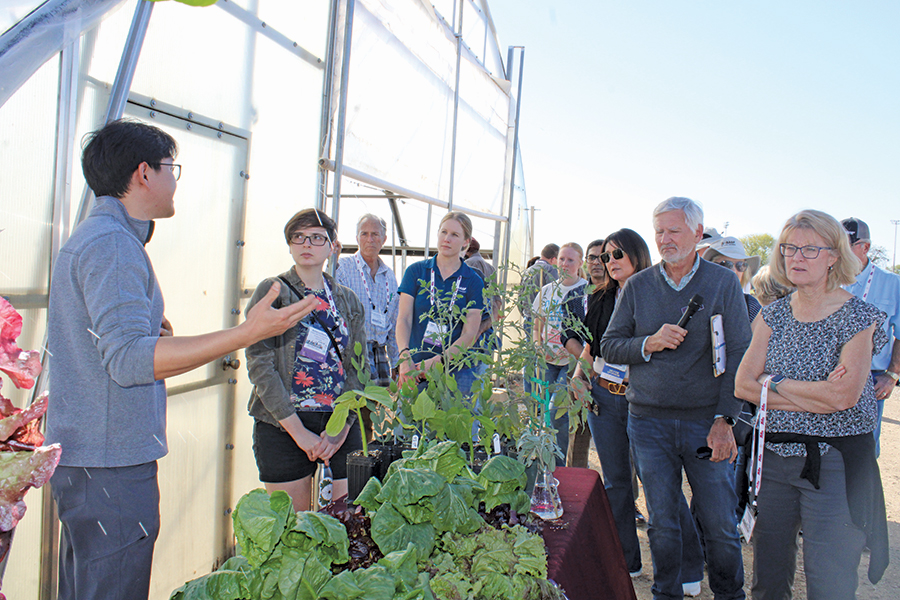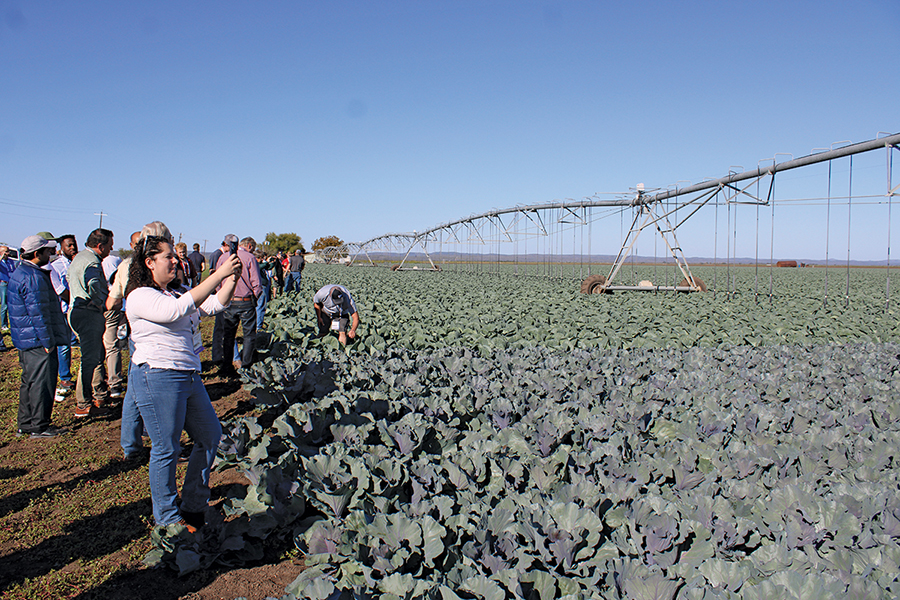

Mar 15, 2024Onion meeting meeting highlights labor, exports, disease
The state of the onion industry’s trade organization is healthy while scientists are battling bacterial diseases that threaten growers’ crops.
Gathering in San Antonio Nov. 29-Dec. 2 for the National Onion Association’s (NOA) annual convention, the joint meeting with the National Allium Research Conference (NARC) allowed growers and researchers to interact and learn more about research on protecting crops from disease.


Tours of Extension research and grower production operations also displayed how Texans are working to improve their crops.
In numerous sessions, researchers made presentations on their projects to tackle bacterial diseases threatening onion production including pink root, stemphylium leaf blight and iris yellow spot.
Joint effort
“This is a great meeting,” said Greg Yielding, executive vice president for NOA.
“Having it with the researchers here is a big plus because what it’s all about is getting everyone together with the researchers. It’s important to know what researchers are doing and how it affects our industry. It’s really good for all of you, growers, shippers and packers, to be here.”
In a general session updating NOA finances and membership, grower committee leaders updated members on the state of the organization. NOA’s goal is to add 30 members each year. One of the new members, Carbon Robotics, demonstrated its LaserWeeder at NOA’s 2023 summer tour in Michigan.
“As we’re dealing with this new tech and new people, we have to get them involved with this because the NOA is a great place to interact with a lot of growers and industry people,” said membership committee co-chair Bruce Klamer of V&W Farms in Byron Center, Michigan.
In January, Jared Gutierrez, a Pasco, Washington, grower and general manager of Volm Cos., became NOA president. Gutierrez, who will lead NOA for the next two years, succeeds Delbert Gehrke of AgriNorthwest in Kennewick, Washington. Barry Vculek, of Four Star Ag in Oakes, North Dakota, moves to first vice president. Volm is a packaging material and equipment supplier.
Gutierrez reported on the organization’s finances.
“We are growing and we are rebuilding,” he said. “The pandemic took a lot of wind out of everyone’s sails in any organization, but we are on the rebound. We are actively growing again.”
A trade barrier for U.S. onion exports is Panama not accepting onions shipped within 75 days of harvest.
“It’s crazy,” said Greg Bennett, founder of Northwest Onion in Brooks, Oregon, and industry/export committee co-chair. “What science is that based on? All they’re doing is trying to protect their onion growers.”
Labor worries
As legislative committee co-chair, Vculek noted the importance of onion growers communicating to lawmakers about labor shortages, which is forcing growers to become more reliant on the H-2A temporary visa program.
“The H-2A labor issue is affecting all of us,” he said. “H-2A is becoming more bureaucratic and too expensive. The way they’re determining wages, we don’t think is fair.”
NOA is also promoting the IR-4 Project, which facilitates regulatory approval of sustainable pest management technologies for specialty crops and specialty uses.
“We are constantly telling senators and congressional people to keep funding it, and fund it at a higher rate,” Vculek said.
Stop the Rot
The Stop the Rot project was a big part of two days of research sessions. Michael Derie, scientific assistant senior at Washington State University (WSU), told attendees the latest on the USDA-funded 12-state project, which includes researchers from Cornell, the University of Georgia, the University of California Agriculture and Natural Resources and Colorado State University.


“In this project, we’re looking at onion bacterial diseases, which are ubiquitous. They’re difficult to manage,” he said. “We lacked effective rapid detection methods for these diseases. There’s a poor understanding of the genetic basis of pathogenicity, the epidemiology of the complex of bacteria that are associated with onions. There’s few or no resistant onion cultivars.”
Other research presented included systemic spray programs to reduce onion center rot, limiting fusarium basal rot losses, protecting onions from maggots in an era without Lorsban, improving irrigation and nitrogen management practices in California desert onions and stemphylium leaf blight in Idaho’s Treasure Valley.
Uvalde Tours
Convention tours took participants to Uvalde, Texas, to view crop research at the Texas A&M AgriLife Extension Service research station and Cargil Farms Produce.
Onions are a big part of the station’s research. Scientists discussed irrigation, water management and studies, environmental stresses, conservation practices and research on soil and crop development.
With heat stress and a lack of water challenging growers, the center is exploring heat tolerant crops, including sesame and non-food fuels and rubber. High tunnels, hydroponics and growing off-season bell peppers are also being studied. The work is critical, because the region has experienced temperatures that are 2 degrees higher on average.
Thrips, a problematic disease vector, and nitrogen deficiencies in spinach, once a larger crop in the region, are also being examined. To aid growers with labor, Texas A&M recently received USDA Specialty Crops Research Initiative funding for a mechanical harvesting trial.
At Cargil Farms, participants viewed cabbage production. Onions, including yellow, white, red and sweet onions, are Cargil’s main crop, but the company also grows bell peppers and specialty peppers. Steve Cargil said lack of labor forced the company to cut onion planting from 800 acres to 300-500 acres.
— Doug Ohlemeier
Top photo: Subas Malla (from left), Texas A&M associate professor in vegetables; Dante Galeazzi, president and CEO of the Texas International Produce Association; and Steve Cargil of Cargil Farms Produce discuss onion and cabbage production at a cabbage field in Uvalde, Texas.














